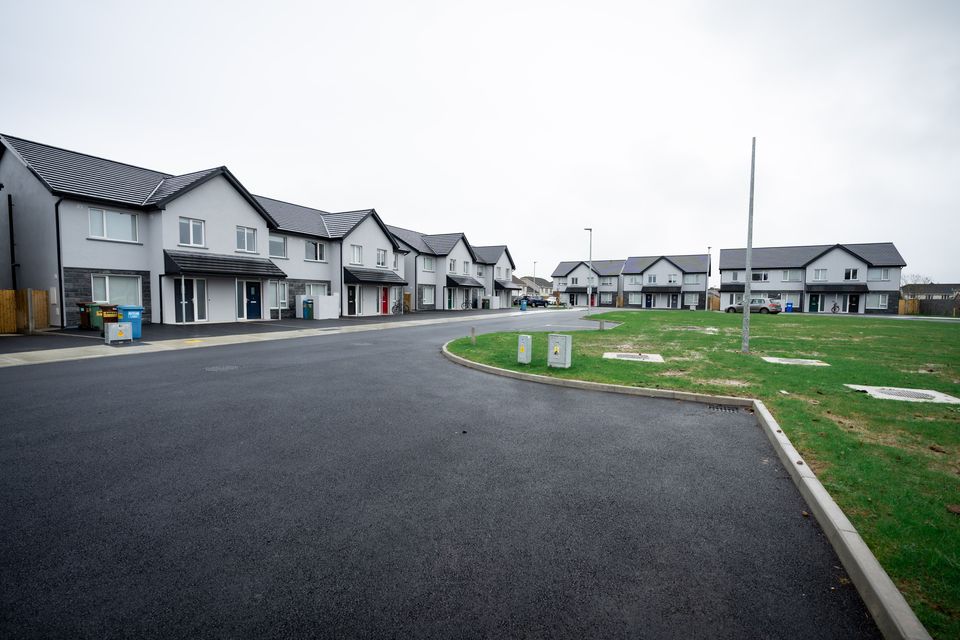University of Limerick failed to pursue cheaper student housing solution
University chose to buy 20 houses for €11.4m instead of developing housing in a semi-vacant building it owns
University of Limerick president Kerstin Mey and chief commercial officer Andrew Flaherty
The University of Limerick (UL) ignored a cheaper accommodation solution that would have delivered more student housing so it could instead pursue a controversial scheme that led to €5.2m being wasted.
A report prepared for the Higher Education Authority (HEA) shows UL considered developing 96 student bed spaces at a semi-vacant building it owns near its campus, but chose instead to buy 20 houses for €11.44m.
The homes accommodate 80 students, do not have planning permission and cost millions of euro more than the alternative proposal at Park Point, a UL building closer to the campus.
A governance crisis engulfing the university since details of the deal went public has jeopardised other key projects.
Officials were working on an attempt to acquire Troy Studios, the site of a former Dell factory near UL, but that project is no longer expected to be pursued.
The university was ordered by the HEA to halt all capital acquisition projects
Plans to develop student housing near the Dublin Road in Limerick city are unlikely to secure state support for some time, after the university was ordered by the HEA to halt all capital acquisition projects due to governance concerns.
The Government approved more than €100m last month for similar student housing works. UL was not considered in that funding round.
The Troy Studio plan was being considered alongside proposals to develop a new veterinary school and staff administration hub, but scored poorly in a preliminary comparative study against other on-campus locations.
However, officials were still keen to progress the Troy Studio acquisition because of its strategic location between UL, the M7 motorway and a proposed new economic strategic development zone adjoining UL’s campus.
John Moroney, a consultant employed by UL to work on property acquisitions, was working on the Troy Studio proposals that are likely to be abandoned.
He previously worked on UL’s purchase of a former Dunnes Stores building the university admitted it overspent €1.5m on.
President of the University of Limerick Kerstin Mey. Photo: Sean Curtin
UL president Professor Kerstin Mey wrote to the HEA in January to confirm details of this overpayment following a review.
Correspondence released by the HEA under Freedom of Information shows the authority was already concerned about the €11.44m housing deal at Rhebogue, 3km from UL, when Prof Mey contacted it.
The university bought 20 homes from Silvergrove Developments last year for €560,000 more than was approved by UL’s governing body. A stamp duty bill brings the total cost to €12.56m — twice the price of comparable homes nearby.
A value-for-money exercise showed UL overpaid for the homes by €5.2m.
Students moved in last October, despite UL having no planning permission to accommodate them there. Limerick City and County Council referred the planning issue to An Bord Pleanála two weeks ago.
Consultants Avison Young, who reviewed the housing deal for the HEA, said cheaper options were ignored.
The houses at Rhebogue, Limerick, purchased by UL for student accommodation
“At an initial stage, UL was considering converting accommodation within the Park Point development close by, which we understand is already in the ownership of UL and partly in use as a hotel and that this property could accommodate 96 bed spaces at a much lower cost,” Avison Young’s report said.
The review also shows no evidence of UL having a negotiation strategy to complete the sale.
It was unclear who represented UL in negotiations with the developer, and the review also found that:
• Public procurement processes were failed.
• Valuations were flawed because they did not appropriately examine potential minimum and maximum values.
• UL relied on planning advice from the developer that contradicted UL’s own planning advice.
• UL did not carry out appropriate checks around taxation and stamp duty.
• Changes were made so the transaction went from a series of incremental payments over five years to a lump sum payment last year.
“Based on our initial review of the price paid and our knowledge of the local market, in our opinion the overall price paid by UL for the 20 residential units was well in excess of their market value at the date of negotiation,” the report said.
University of Limerick president Kerstin Mey and chief commercial officer Andrew Flaherty
UL’s chief commercial officer (CCO) Andrew Flaherty, who brought the deal through university approval processes, has since told the HEA that the public spending code should not apply to the houses because they were going to be managed by a university-owned subsidiary company.
“The spending code applies to all projects involving state funds. As this project was always going to be paid for and managed by Plassey Campus Centre (PCC) via Plassey Centre Trust, the spending code does not apply to PCC funds,” Mr Flaherty wrote in an email sent to the HEA two months ago.
“This was the understanding of both the chief financial and performance officer and the CCO from the outset based on views they had received from prior discussions on projects and PCC funds.”
Six sources across the higher education sector and the Government have questioned this analysis. It also jars with a presentation Mr Flaherty gave officials who approved the deal.
UL’s publicly available policy for acquiring new property states that all employees must give regard to the public spending code for such deals.
This policy document is dated June 2022 and is attributed to UL’s chief corporate officer, a role Mr Flaherty held at the time.
University of Limerick
A presentation Mr Flaherty gave to members of UL’s governing authority and executive committee in August 2022 said the new acquisition policy had been followed.
A spokesman for UL said a HEA review of specific issues around the Rhebogue deal has been sought, and it would be inappropriate for the university to comment until this is completed.
UL officials will meet with the Oireachtas Public Accounts Committee on Thursday.
Fire raised fears flats would have to close
University of Limerick (UL) officials feared having to shut a student village if emergency fire safety works were delayed because of major spending being suspended over governance problems.
A fire at the on-campus s last year “highlighted fire safety deficiencies”, UL told the Higher Education Authority (HEA) last month.
Plans are in place to urgently address the problems this summer but UL was worried a HEA directive to pause capital spending could delay the works. The HEA has since said it is happy for the works to take place. Spending had been stopped after UL admitted paying €5.2m more than it should have on a separate student accommodation scheme.
Last year’s fire is understood to have spread from a disposable barbecue being used on a balcony.
The university said the complex was declared safe to continue housing students.
Local fire officers advised the college to conduct additional remedial works on cladding outside the building. College officials were wary the fire officers could ask UL to close the complex if the remedial works were delayed, UL Provost Professor Shane Kilcommins said in correspondence released under Freedom of Information.
“We are working with the local authority fire officers who require us, as an urgent health and safety matter, to undertake emergency remedial work. We are also examining other villages, Dromroe and Thomond, which have similar external timber cladding,” Prof Kilcommins wrote.
These complexes were assessed recently and, while final reports have not been completed, it is not expected additional works will be needed at Dromroe or Thomond.
UL’s spokesman said works required to improve the building are “progressing immediately” with no impact on accommodation availability.
“There is a robust fire safety management programme in all residences and UL has the highest level of networked fire detection technology in all buildings on campus,” the spokesman added.
Join the Irish Independent WhatsApp channel
Stay up to date with all the latest news



















